Widening the Dharma Gate with New Home,
Ashland Zen Center Begins Residential Practice
Written by: Tendo Stacy Waymire and Kigetsu Ramana Waymire
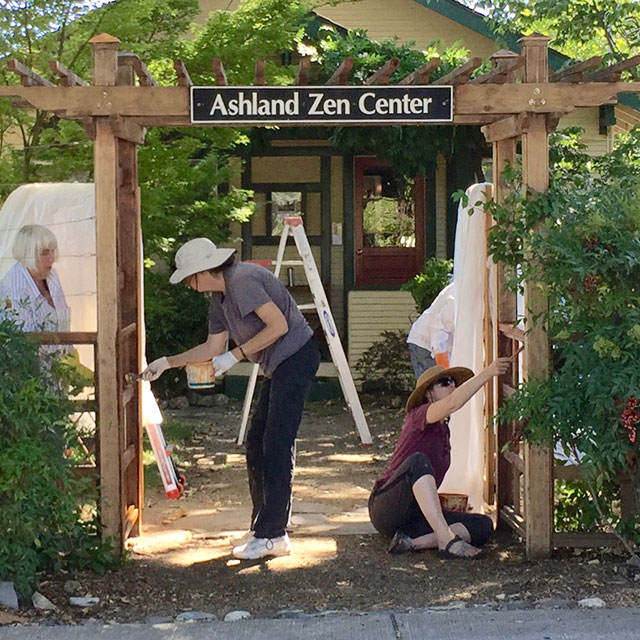
Sangha hands keep the current facility in good repair. In 2016, members apply a fresh coat of stain to the entry gate.
Photos: Courtesy of Ashland Zen Center.
The Ashland Zen Center is preparing to take a big step into residential practice by breaking ground for new facilities.
The project will include long and short-term residential housing for retreatants, a dorm for meditation intensives, a gathering hall, kitchen, meeting spaces and support facilities. It is both exciting and humbling when we reflect on how we have arrived at this point.
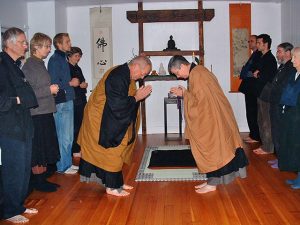
Senseis Jintei Harold Little and Etsudo Patty Krahl bow to each other in 2005, during the altar dedication ceremony in the remodeled farmhouse at 740 Tolman Creek Road.
In 2015 it was our great good fortune to acquire the property next to the Ashland Zen Center.
The sangha leaned into the hard work of clearing the land, which housed a large dilapidated building overgrown with blackberries and declining cottonwood trees. We salvaged, sold, recycled, repurposed, donated and demolished.
After filling 26 commercial dumpsters with material from the demolition and cleanup, we now have a buildable lot.
Sangha energies then turned to planning what we will need on the site, and developing designs. Generous sangha donations have built a $400,000 construction fund for a 4,000-square-foot residential practice center. An architect friend of Ashland Zen Center designed it as a gift to the sangha.

A street-view elevation of the facility planned for 2017. The structure will include residence for priests, a kitchen, meeting room, dorm, and an upstairs apartment for guests.
This fall we kicked off a complementary project, to build a second-story apartment rental. This guest apartment is to help ensure sustainability, by creating a place of refuge and beauty for visitors coming to Ashland.
Like other practice centers we have an eye on sustainability. Although no one is paid at Ashland Zen Center, we do have the ongoing expenses of utilities, repairs and maintenance, zendo and gardening supplies, which the rent from the new apartment will help cover.
For the $100,000 needed to fund the apartment construction we are again turning to our wide circle of friends and fellow practitioners. One sangha family generously kicked off our fundraising with a donation of $10,000!
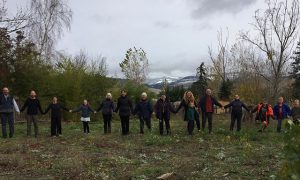
Ashland Zen Center sangha members stand together where they will break ground on their new building project.
Here in the Rogue Valley of southern Oregon, Ashland Zen Center has for 23 years offered Soto Zen Buddhist practice in the lineage of Shunryu Suzuki Roshi.
The center started when teachers Etsudo Patty Krahl Sensei and Jintei Harold Little Sensei set up a few zafus (sitting cushions) in their living room once a week. In the spirit of Suzuki Roshi, they simply invited people to join them in zazen.
As the number of practitioners grew, the zendo (meditation hall) moved from the living room to space generously offered by an Aikido sensei. We were able to use his training dojo when it was not in use, setting up and taking down the entire zendo for daily practice.
As our practice and sangha evolved we next rented some space in a house we shared with two artists’ studios. There we had a shared kitchen to support sesshins (multiple-day retreats), a living room converted into a zendo, and a shared bathroom. A bedroom became a combination library and dokusan room, for private teacher–student meetings.
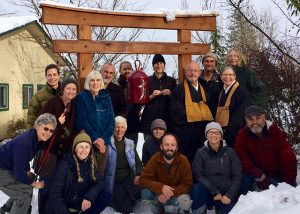
At the end of Rohatsu sesshin in 2015, warm smiles in the snow. The sangha surrounds Senseis Jintei Harold Little and Etsudo Patty Krahl.
Our small-town sangha grew further and we were able to rent a small house, remodel it for similar purposes, and put up our first sign.
Some sesshins packed this zendo, with people sitting in double rows, bowing head to bottom. Supporters prepared meals in the small kitchen, and out on the back porch with ice chests.
This intimacy nourished our shared commitment, and we decided to try to actually buy land and larger buildings. The generosity that followed from so many people was matched by diligence, to find a site that met both our needs and our means.
The sangha found that in our current home: a converted farmhouse, barn, and cottage, on three-quarters of an acre at the edge of town.
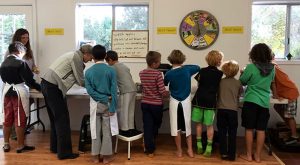
During the Sunday Dharma Kids program, children learn the value of working for the benefit of others. Here they make applesauce from apples they picked on the property.
Our weekly schedule includes zazen (meditation) on weekday mornings and Wednesday nights, and a full program on Sundays.
Throughout the year we offer sittings and multi-day sesshins. We offer Buddhist ceremonies seasonally, including Buddha’s birthday celebration, Segaki, (feeding the hungry ghosts), and Buddha’s enlightenment celebration.
We also offer a family practice program every two weeks, and an annual summer camp for children.
Donations of time, money and effort account for everything at Ashland Zen Center, and our sangha utilizes every nook and cranny of our existing facilities..
Countless gift-bestowing hands manifested the cushions we meditate on, as well as the temple bells, altars, Buddha and bodhisattva statues, and framed art. Rinso-in, Suzuki Roshi’s home temple in Japan, donated the butsudan (Japanese home altar), as well as ornamental trees, gates, and benches.
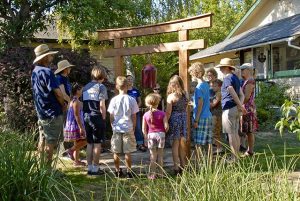
Ashland Zen Center holds an annual summer camp for children, Friendship Mountain. Here, campers and counselors circle up in the morning around the friendship bell as the day begins.
The sangha also has harnessed the temple grounds to support the dharma. We harvest apples, berries, figs, plums and persimmons there, while the vegetable garden supplies fresh produce for retreats.
From our conversations with other Zen centers we know that our story is like that of many others, slowly putting down the roots of Buddhist practice in American soil.
We hope those of you reading this article will open your hearts to this project. Together we can widen the dharma gate in the Pacific Northwest.
With your help Ashland Zen Center will become a financially sustainable, residential practice center now and in the future. To learn more and to make a donation, go to the Ashland Zen Center website.
